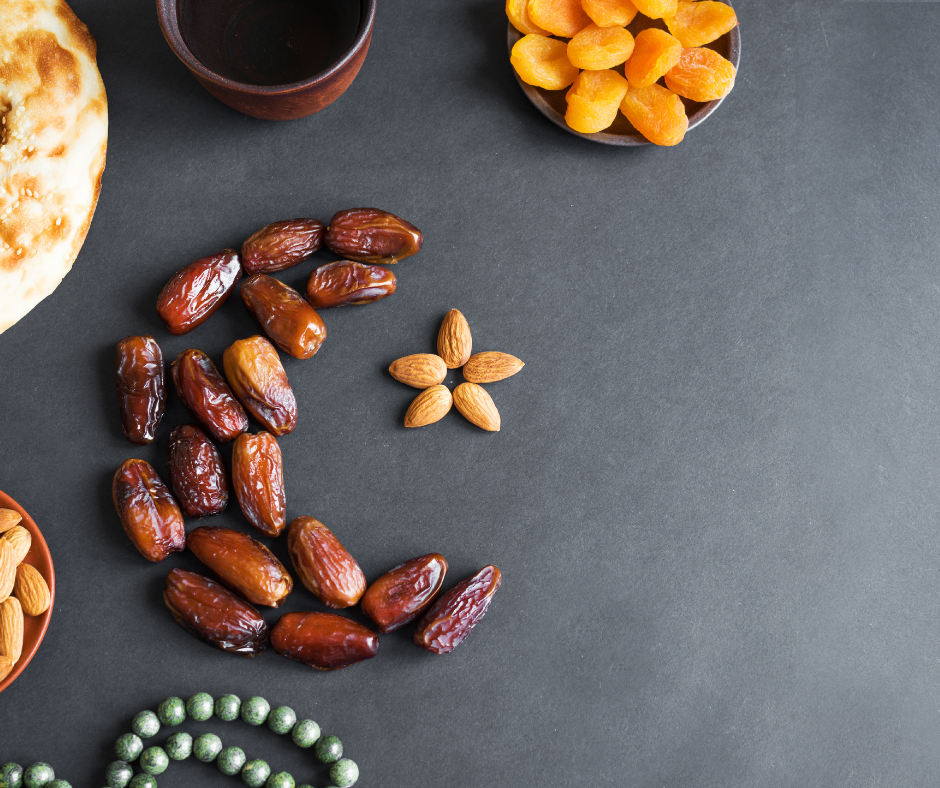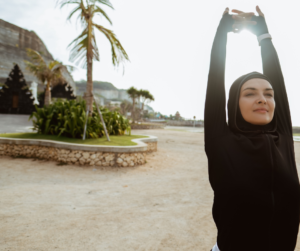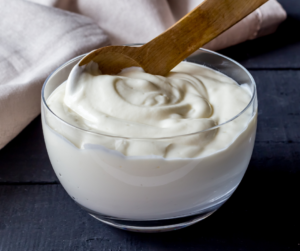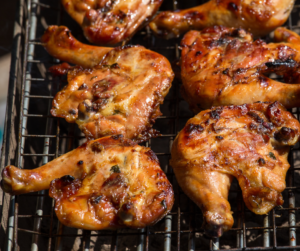Wondering if it’s a good idea to continue following your running program and keep your hopes high of achieving your goals, even though they fall after or during Ramadan?
Maintaining your fitness and continuing to run and train at adjusted intensities during Ramadan has been proven to provide several positive health benefits such as increased energy levels, cognitive function, immunity, and muscular ability and mobility.
In this article, we’re going to have a look at…
- Why You Should Continue Training During Ramadan
- When Training During Ramadan Becomes Unsafe
- 7 Ways To Train Safely During Ramadan
Let’s get started!

Why You Should Continue Training During Ramadan
Training during Ramadan should be done cautiously and the most important factor is to always listen to how your body is feeling.
If you haven’t been training in the build-up to Ramadan then we recommend opting for very light-intensity exercises such as going for walks and some beginner strength classes.
Here at Coach Parry, we’re massive advocates of strength training. We’ve put together this free strength training plan for runners that you can do once a week, at home and with no expensive equipment needed. You can access it by clicking here.
If you have been training before Ramadan then your goal for the 30 days should be to maintain the level of fitness that you have, rather than trying to increase fitness levels. That means reducing your current training intensity and volume on your current training program while placing high importance on what you consume when breaking the fast.
It’s highly recommended to continue training and to keep active during Ramadan. Loads of people say that continuing to train helps them feel more energized during fasting hours. But nutrition and recovery are key at this time.
So, when is it not a good idea to continue training during Ramadan
When Training During Ramadan Becomes Unsafe
Running or strength training during fasting hours means that you’re doing it on an empty stomach (ie. no fuel to provide the energy required for exercise)… this could easily lead to a drop in your blood pressure and blood sugar levels, which could result in you feeling dizzy and possibly lead to your fainting. This is a sure sign that you should stop what you’re doing and reassess your training intensity and volume as well as what you’re eating and how much liquid you are consuming when you break the fast.

By not listening to your body, by not eating the right nutritious foods, and by not hydrating correctly during Ramadan you can experience serious negative consequences on your fitness levels and your overall health.
With that being said, let’s have a look at how you could achieve the opposite and thrive while training during Ramadan…
7 Ways To Train Safely During Ramadan
- Plan Your Training Sessions Carefully
You should take note of your current level of fitness and aim to maintain it or even drop slightly for the beginning while your body adjusts to the fasting. consider just maintaining your current level (or even dropping slightly for a few weeks) rather than pushing to improve.
It is advised to follow a training program created with your specific needs in mind. Depending on your current fitness level, how your body is feeling at all times, and the possibility of a goal race in the future your training could look something like this:
| Monday | Light intensity strength class (45 mins) |
| Tuesday | Easy run (45 mins) |
| Wednesday | Light intensity strength class (45 mins) |
| Thursday | Easy run (45 mins) |
| Friday | Rest day |
| Saturday | Easy long run (1hr 30 mins) |
| Sunday | Recovery run (45 mins) |
The above is a very simple example, the best thing to do would be to chat to one of the Coach Parry Coaches who could put together a more detailed plan just for you.
- Find a Time To Train That Works Best For You
When choosing what time of the day you want to train, you should be mindful of when you will be breaking the fast and how your body feels early morning or in the evening based on how your day looks.
For those who have a day job that leaves them exhausted by the end of the day then training in the morning would be better, and then it’s a matter of if they can wake up early enough to train before breaking the fast or after breaking the fast before work.
For some, training can only happen right after the morning fast break, for others they prefer to train right before they break the fast in the evening so that they are guaranteed water and a meal after training, for others it means training after the evening meal but then sacrificing sleep.
- Adequate Hydration Is Vital
It’s vital that you hydrate adequately to compensate for the body fluids lost while you are training or when you are fasting.
Prepare for your day of no liquids by drinking water as often as possible at night, keep a big bottle of water next to your bed so that when you can, try and drink about a cup at a time.
Pro Tip: Food also plays a huge part in keeping you hydrated. Foods that contain a lot of sugar can dehydrate you while fruit can provide extra hydration.
Everything You Need To Know About Hydrating During Ramadan
It is unlikely that mild dehydration associated with Ramadan will negatively affect short-term exercise, i.e. under one hour.
(This may not be the case during longer-duration events especially if these events take place in high ambient conditions.)
Athletes during Ramadan should make increased efforts to ensure that exercise is commenced well hydrated and that rehydration occurs as soon as it is feasibly possible.
This is really only a problem when exercise is performed prior to the Iftar meal (evening meal).
It may also be an option to utilize cold mouthwashes during exercise to help prevent feelings of thirst, however, this will require discussion with religious authorities.
It is important to remember that rehydration should not only be focused on the restoration of fluids but also must consider the specific electrolytes that will be lost especially sodium.
This may involve the addition of electrolytes to fluids especially if athletes have performed prolonged exercise in the heat prior to the Iftar meal.
Drinking sufficient fluids from Iftar until Suhoor (Morning meal) is crucial while taking into consideration the need for additional electrolytes. This can be done either by drinking rehydration solutions or by drinking and eating at the same time. This will help your body to retain water.
It should be noted that it would be unwise to attempt to hyperhydrate by drinking copious amounts of water at the Suhoor meal as this can lead to prompt diuresis and ultimately could contribute to further dehydration.
The athlete can easily determine whether their hydration plan is sufficient to balance their losses by checking body weight, and monitoring the color and amount of urine produced, especially in the morning (urine should be clear and of a normal volume)
Strategies to reduce sweating should be used. For example, avoid senseless exposure to heat or sun. In addition, consider using “cooling vests”, cold baths, fans, etc. during and after the effort, especially if you are performing in a hot atmosphere.

- Good Nutrition Is Vital
Taking in appropriate amounts of carbohydrates and proteins before and after exercise is vital if you want to recover and perform adequately while training during Ramadan.
Nutritional Considerations
The critical considerations for nutrition include maintaining energy balance, consumption of an athletic-specific quantity and distribution of macronutrients, and maintaining hydration (or at least preventing severe hypohydration).
It is important to consider the 3 Ts: Total, Type, and Timing of nutrition intake.
Total and Type
- Ensure adequate energy intake
- If trying to maintain a high training load or if you are planning any races during Ramadan, ensure a high carbohydrate intake (6-10 g/kg body mass).
- This should be achieved predominantly during the Iftar with some contribution during the Suhoor.
- There may be benefits from the deliberate switch to some high GI and low residue carbohydrate sources to help with gastrointestinal discomforts, such as canned fruit, fruit juice, white bread, and cereals with low fiber content.
- Liquid carbohydrate intake can also help if energy requirements are very high, such as sports drinks or fruit juice.
- Consume at break of fast and meal before dawn, and other meals during the evening, especially where these meals represent post-, pre-, or in-exercise intake.
- Set targets according to the fuel cost of exercise.
- Consume small amounts during exercise undertaken after the fast is broken, even if there is little need for additional fuel. Mouth contact with carbohydrates may promote a ‘‘happier’’ brain for better performance, especially if otherwise fatigued.
- Eat immediately after exercise if possible to enhance your refueling rate.
- Consume low glycaemic carbohydrate choices at meals consumed before dawn to allow slow release of glucose.
- Adequate protein intake (~1.6 g per kg body mass per day) to maximize muscle protein synthesis and promote muscle growth and repair.
- For smaller endurance athletes weighing approximately 50kg, this would be easily achieved in the 2 main meals, however, this may present a challenge for larger athletes.
- Larger athletes can explore the use of protein shakes, including a slow-releasing casein shake.
- Consume 20 g ‘‘fast’’ high-quality protein soon after exercise where possible, but note that enhanced protein synthesis from exercise persists for 16–24 hours.
- In absence of information on the best protein spread over the day, consume protein at each meal opportunity (avoid eating only carbohydrate-rich food choices).
- Consume ‘‘slow’’ proteins at meals consumed before dawn to help with protein balance over the day.
- Add protein to carbohydrate-rich snacks to enhance muscle glycogen storage when carbohydrate targets can’t be met.
Timing
Reserve daytime training for technical, tactical, and light sessions. Do higher intensity sessions or strength sessions closer to or even following the Iftar. Post-training protein feeding results in the most favorable anabolic environment for muscle growth and repair.
Theoretical feeding and training structure:
- Protein distributed throughout the day including immediate post-training (achieving 4 x 0.4g/kg)
- Carbohydrates are to be provided before and after ‘high-intensity sessions (achieving 6-8g/kg),
- Slow-releasing proteins pre-bed and pre-fast to give a more sustained supply of amino acids to facilitate recovery.
Example:
5h00 Final pre-dawn meal (Suhoor)
- Carbohydrate (2 g/kg)
- Protein (0.4 g/kg)
- Yogurt with fruit; toast with egg and grated cheese and fruit juice
6h00
- Slow-release protein (0.4 g/kg), e.g. casein
- Milk, yogurt (casein)
6h30
- Sunrise
- Beginning of fast
9h00 – 14h00
- Preferable light training sessions
14h00 – 18h00
- Resting preferred
- Nap if possible
19h00 – Sunset
- Post-sunset recovery shake containing 1 g/kg carbohydrate and 0.4 g/kg protein to break the fast
- Meal replacement shake, recovery shake, or smoothie with milk/yogurt, fruit, and peanut butter or protein powder
- Follow up with strength or high-intensity training
19h30 – 20h00 Iftar
- Iftar meal containing 4 g/kg carbohydrate and 0.4 g/kg protein
- Chicken, fish, or beef served with rice, legumes, and vegetables. Add fluid to the meal, e.g. drinking yogurt, milk, fruit juice, or cordial.

22h00
- Slow-release protein containing 0.4 g/kg protein with some carbohydrates alongside (1 g/kg body mass)
- Yogurt with fruit and nuts or seeds OR Cereal and milk OR Peanut butter sandwiches with banana and milk
Pro Tip: Avoid processed, and salty foods as these will not keep you full and will dehydrate you.
If you have any hydration or nutrition-related concerns, we have our very own registered dietician – Nicki de Villiers.
She has been working in the field of dietetics for around 20 years and has been concentrating on sports nutrition for the last 14 years and started working at High-Performance Centre at the University of Pretoria around 10 years ago.
Get in touch with Nicki here.
- It’s Ok To Increase Your Rest Days
Without consistent nutrients throughout the day to help your body recover fully, it will cause more fatigue that is carried over to the next training session.
It takes time for the body to repair the muscle fibers and make improvements after sessions, especially during Ramadan, so don’t feel bad to take an extra rest day if you feel that it’s what your body needs.
If you find that you are struggling to fall asleep and are feeling fatigued then you need to add more rest days into your weekly schedule.
Remember, fasting during Ramadan requires self-discipline and sacrifice, but you don’t have to sacrifice your well being so rest as much as you feel you need to.
Is Sleep Important For Runners: FACTS To Improve Your Running
- Scale Back Training Intensity & Volume
You need to dial down on the intensity and moderate the volume of your runs.
Starting with lower-intensity and shorter-duration workouts, and gradually building up as the body adapts to the changes of fasting is what we recommend.
The most important thing to remember is that not everyone will react the same to their fasting and that’s why you need to start at a low intensity and see how your body reacts.
7. Don’t Compete
Competing in races will increase your heart rate and is not recommended. During Ramadan, you should avoid all high-intensity activities that will leave you feeling worn down, fatigued, dehydrated, and at serious injury risk.
Ramadan is not a time for competing and trying to tackle new goals… it’s a time to maintain what you’ve worked on in the months leading up to Ramadan.
How and when you should be training during Ramadan should be purely based on your respecting how your body and mind are feeling. Sticking to the goal of being gentle on yourself while trying to maintain your health and sustain your fitness level should be your priority.



Comments are closed.